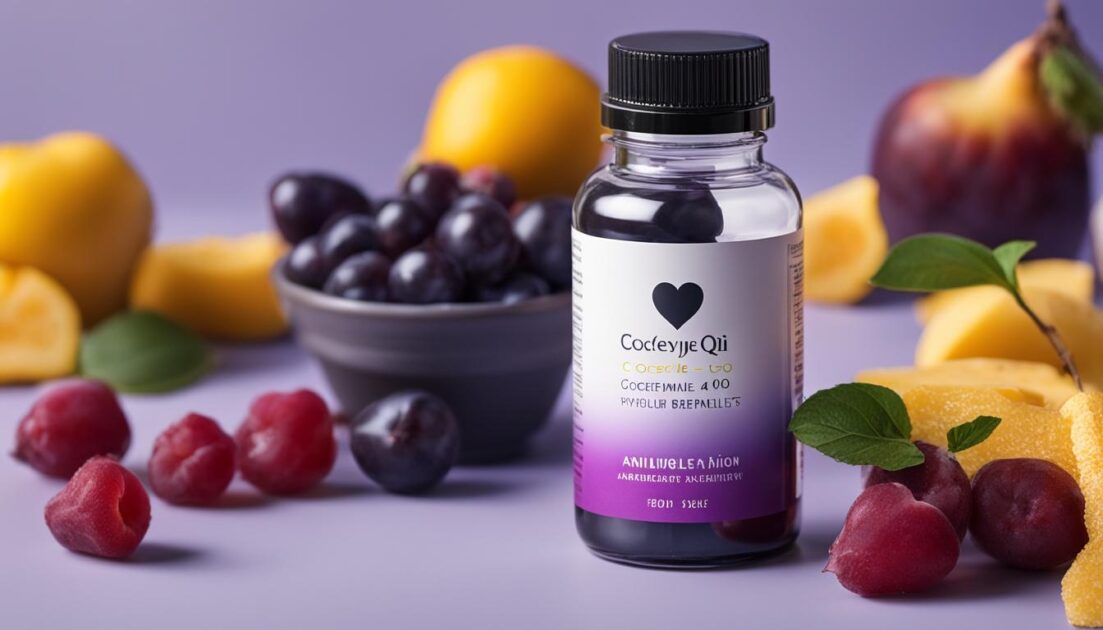Coenzyme Q10 (CoQ10) is a natural antioxidant produced by your body that plays a crucial role in cell growth and maintenance. As you age, the levels of CoQ10 in your body decrease, and certain conditions such as heart disease and the use of cholesterol-lowering drugs can also lower CoQ10 levels. While CoQ10 is found in certain foods like meat, fish, and nuts, these sources may not provide enough to significantly increase CoQ10 levels in your body. That’s why CoQ10 dietary supplements are available in various forms such as capsules, chewable tablets, and liquid syrups.
Research suggests that CoQ10 may have various benefits, including improving symptoms of congestive heart failure, reducing blood pressure, and decreasing the frequency of migraines. It may also help in reducing low-density lipoprotein (LDL) cholesterol levels in people with diabetes. However, the research on CoQ10’s effectiveness for different conditions is mixed, and more studies are needed. It’s important to consult with your doctor before taking CoQ10 supplements, especially if you have any existing health conditions or are taking any medications.
Key Takeaways
- Coenzyme Q10 (CoQ10) is a natural antioxidant produced by the body.
- CoQ10 levels decrease with age and certain health conditions.
- Dietary sources may not provide sufficient CoQ10, so supplements are available.
- Research suggests potential benefits for heart health, blood pressure, migraines, and cholesterol.
- Consult with a doctor before taking CoQ10 supplements.
History and Origin of Coenzyme Q10

Coenzyme Q10, also known as CoQ10, has a fascinating history and origin. It was first discovered in 1957 by Dr. Frederick Crane, who isolated the substance from beef heart mitochondria. To highlight its ubiquitous presence in every cell of the body, it was initially named “ubiquinone”. However, as research advanced, its role in vital biochemical reactions became evident, leading to the name “coenzyme Q10”.
CoQ10 is not exclusive to humans; it can be found naturally in many living organisms, including bacteria, plants, and animals. The fact that it is synthesized in the body and can also be obtained through dietary sources underscores its importance for overall health.
It is worth noting that the body’s production of CoQ10 decreases with age, resulting in lower levels in older individuals. This decline in natural synthesis emphasizes the potential benefits of CoQ10 supplementation to maintain optimal levels and support various bodily functions.
Quotes:
“Coenzyme Q10, also known as CoQ10, plays a crucial role in the body’s biochemical reactions.” – Dr. Frederick Crane
Interesting Fact:
CoQ10’s presence in every cell of the body led to its initial name “ubiquinone”.
Now that we have explored Coenzyme Q10’s history and origin, let’s dive deeper into its properties and key components in the next section.
Properties and Key Components of Coenzyme Q10

Coenzyme Q10, also known as CoQ10, is a vital compound with unique properties that contribute to its numerous health benefits. Let’s explore the key components and properties of Coenzyme Q10.
Components of Coenzyme Q10
The main components of Coenzyme Q10 are:
- A benzoquinone ring
- A side chain of 10 isoprenoid units
These components give CoQ10 its distinct molecular structure, essential for its functions within the body.
Properties of Coenzyme Q10
Antioxidant Protection: Coenzyme Q10 acts as a potent antioxidant, neutralizing harmful free radicals and protecting cells from oxidative damage. This property helps maintain cellular health and supports overall well-being.
Cellular Energy Production: CoQ10 plays a crucial role in the production of adenosine triphosphate (ATP), the energy currency of cells. It is a vital component of the mitochondrial electron transport chain, where it facilitates the conversion of nutrients into usable energy.
Antioxidant Regeneration: CoQ10 has the remarkable ability to regenerate and recycle other antioxidants, such as vitamin E. This synergistic effect enhances the overall antioxidant capacity of the body, further safeguarding against oxidative stress.
Coenzyme Q10’s unique properties make it an indispensable molecule for cellular energy production, antioxidant defense, and overall health.
Natural Usage of Coenzyme Q10

Coenzyme Q10 (CoQ10) has a wide range of natural uses that extend beyond its role as a dietary supplement. Let’s explore some of the different ways CoQ10 is incorporated into various aspects of our daily lives.
Culinary Uses of Coenzyme Q10
CoQ10 can be used in culinary applications to not only enhance flavor but also provide additional health benefits. Here are some examples:
- CoQ10 can be added to smoothies or juices for an antioxidant boost.
- It can be used in salad dressings, marinades, or sauces to enhance the overall taste.
- CoQ10-infused oils can be drizzled over cooked vegetables or added to pasta dishes for added nutritional value.
Personal Products with Coenzyme Q10
Due to its antioxidant properties, CoQ10 is a popular ingredient in many personal care products. Here are some examples:
- Skincare products like moisturizers, serums, and eye creams often feature CoQ10 to help fight signs of aging and promote skin rejuvenation.
- Haircare products such as shampoos, conditioners, and hair masks may contain CoQ10 to nourish the hair and scalp.
- CoQ10 can be found in lip balms and toothpaste, offering additional protection and support for oral health.
Household Uses of Coenzyme Q10
CoQ10’s effectiveness as an antioxidant also extends to household products, where it contributes to their overall efficiency. Some examples include:
- Laundry detergents with added CoQ10 may help remove stains and improve the cleanliness of your clothes.
- Cleaning agents that incorporate CoQ10 can help tackle tough messes and leave surfaces looking fresh.
- CoQ10-infused air fresheners may provide an added layer of freshness to your living space.
Topical Uses of Coenzyme Q10
CoQ10 is used topically in creams, lotions, and other skincare products due to its potential anti-aging effects and skin rejuvenation properties. Here are some ways it can be applied:
- CoQ10 creams and lotions can be used to moisturize and nourish the skin, promoting a youthful appearance.
- Eye creams containing CoQ10 may help reduce the appearance of wrinkles and fine lines around the eyes.
- CoQ10-infused masks or patches can provide targeted treatment to specific areas of the skin.
As you can see, Coenzyme Q10 has a diverse range of natural uses in cooking, personal care, household products, and skincare. Incorporating CoQ10 into different aspects of our daily lives allows us to reap its potential benefits beyond traditional dietary supplements.
Benefits and Applications of Coenzyme Q10

Coenzyme Q10 (CoQ10) offers a range of potential benefits and applications that can improve overall health and well-being. Its antioxidant properties play a crucial role in protecting the body’s cells from oxidative damage, reducing the risk of chronic diseases.
Studies have extensively explored the potential benefits of CoQ10 in various conditions, including congestive heart failure, diabetes, Parkinson’s disease, and migraines. The findings suggest that CoQ10 supplementation may help improve heart function, reduce blood pressure, lower LDL cholesterol levels, and even decrease the frequency of migraines.
One of the primary applications of CoQ10 is to support cellular energy production. By enhancing the production of adenosine triphosphate (ATP), CoQ10 helps optimize energy levels and improve physical performance. This makes it a popular supplement among athletes and individuals seeking to enhance their overall vitality.
Now, let’s take a closer look at the potential benefits of CoQ10 in different areas:
Heart Health
CoQ10 has been extensively studied for its potential benefits in supporting heart health. Its antioxidant properties help protect the heart from oxidative stress and damage. Research suggests that supplementation with CoQ10 may improve heart function, enhance exercise capacity, and reduce the symptoms of heart failure.
Metabolic Health
In individuals with diabetes, CoQ10 supplementation may help lower LDL cholesterol levels and improve glycemic control. It has been shown to have a positive impact on insulin sensitivity and may play a role in managing diabetic complications.
Neurological Health
CoQ10 has been investigated for its potential neuroprotective effects in conditions such as Parkinson’s disease and migraines. Research suggests that CoQ10 supplementation may help reduce the progression of Parkinson’s disease and decrease the frequency and intensity of migraines.
Aging and Skin Health
As an antioxidant, CoQ10 helps protect the skin from oxidative damage caused by free radicals. It also supports the energy production of skin cells, promoting a youthful and radiant appearance. CoQ10 is commonly used in skincare products for its potential anti-aging effects and ability to enhance skin rejuvenation.
In addition to these applications, CoQ10 may have other potential benefits in areas such as fertility, immune health, and exercise recovery. More research is needed to fully understand the extent of its benefits and applications.
By incorporating CoQ10 into your health routine, you can potentially experience the numerous benefits it offers. However, it’s important to consult with your healthcare professional before starting any supplementation to determine the appropriate dosage and ensure it doesn’t interfere with any existing medications or health conditions.
CoQ10 has the potential to support your overall health and well-being, so consider adding it to your daily routine to experience its benefits firsthand.
| Condition | Potential Benefits |
|---|---|
| Congestive heart failure | Improves heart function Lowers blood pressure |
| Diabetes | Reduces LDL cholesterol levels Improves glycemic control |
| Parkinson’s disease | Slows disease progression |
| Migraines | Reduces frequency and intensity |
| Skin health | Anti-aging effects Enhances skin rejuvenation |
Coenzyme Q10 offers a wide range of benefits and applications, making it a valuable supplement for supporting various aspects of health. Incorporate CoQ10 into your wellness routine under the guidance of a healthcare professional to experience its potential benefits for yourself.
Usage Tips and Cautions for Coenzyme Q10

When it comes to using Coenzyme Q10, it’s essential to be aware of certain tips and cautions to ensure a safe and effective experience.
1. Consult with a healthcare professional: Before starting CoQ10 supplements, it is highly recommended to consult with a healthcare professional, especially if you have any existing health conditions or are taking any medications. They can provide personalized guidance on the appropriate dosage and potential interactions.
2. Take under supervision: CoQ10 is generally considered safe to take under the supervision of a doctor. This allows for proper monitoring and adjustment of the dosage if necessary.
3. Be mindful of potential side effects: While CoQ10 is well-tolerated by most individuals, mild side effects such as digestive problems, headaches, and fatigue may occur in some cases. If you experience any unusual or persistent symptoms, it’s recommended to consult with your healthcare professional.
4. Pregnancy and breastfeeding: The safety of CoQ10 use during pregnancy and breastfeeding has not been established. Therefore, it is best to avoid using CoQ10 without medical approval if you are pregnant or breastfeeding.
5. Store properly: To maintain the quality and effectiveness of CoQ10, it’s important to store it in a cool, dry place away from direct sunlight. Excessive heat, moisture, and humidity can degrade the active ingredients.
By following these usage tips and cautions, you can make the most of Coenzyme Q10’s potential benefits while ensuring your overall well-being and safety.
Selecting the Best Quality Coenzyme Q10
When it comes to choosing Coenzyme Q10 (CoQ10) supplements, prioritizing quality is essential to ensure maximum effectiveness and safety. Here are some key considerations to keep in mind:
1. Choose Reputable Manufacturers
Opt for products that are manufactured by reputable companies with a track record of producing high-quality supplements. Look for well-established brands that are known for their commitment to quality and adherence to good manufacturing practices.
2. Independent Testing
Look for CoQ10 supplements that have been independently tested by third-party organizations for purity, potency, and authenticity. Independent testing helps ensure that the product contains the stated amount of active ingredients and is free from contaminants.
3. Look for Certifications
Check for certifications or seals of approval from reputable third-party testing organizations. These certifications indicate that the product has undergone rigorous testing and meets high-quality standards. Examples of trusted certifications include the United States Pharmacopeia (USP) Verified Mark and ConsumerLab.com’s Quality Approved Seal.
4. Consider Bioavailability-Enhancing Formulations
Some CoQ10 supplements are formulated with bioavailability-enhancing ingredients or delivery systems, such as ubiquinol or liposomal formulations. These formulations may improve the absorption and utilization of CoQ10 in the body, potentially enhancing its effectiveness.
5. Dosage and Form
Consider the dosage and form of the CoQ10 supplement that best suits your needs and preferences. CoQ10 is available in various forms, including capsules, softgels, and chewable tablets. Choose a dosage that aligns with your healthcare professional’s recommendations and your specific requirements.
6. Customer Reviews and Feedback
Take the time to read customer reviews and feedback about the CoQ10 supplement you’re considering. While individual experiences may vary, customer reviews can provide insights into the product’s quality, effectiveness, and any potential side effects.
By following these guidelines, you can make an informed decision and select the best quality Coenzyme Q10 supplement that meets your needs. Remember to consult with your healthcare professional before starting any new supplement regimen.
Proper Storage of Coenzyme Q10
Proper storage of Coenzyme Q10 is crucial to maintain its quality and effectiveness. By following these storage guidelines, you can ensure the longevity and potency of your CoQ10 supplements:
- Store in a cool, dry place: It is recommended to store CoQ10 supplements in a cool area away from direct sunlight. Heat can degrade the active ingredients and reduce the efficacy of the supplement.
- Avoid excessive heat, moisture, and humidity: Exposure to excessive heat, moisture, or humidity can also compromise the quality of CoQ10. Keep the supplements away from the bathroom or kitchen, where the humidity levels are higher.
- Follow product label instructions: Each CoQ10 supplement may have specific storage instructions provided by the manufacturer. It’s essential to read and follow these instructions carefully to maintain the supplement’s potency.
- Check the expiration date: Before consuming CoQ10 supplements, always check the expiration date. Expired supplements may not provide the desired effects or may even have reduced potency.
By storing Coenzyme Q10 properly, you can ensure that it remains fresh and effective, allowing you to maximize its potential benefits. Take care of your CoQ10 supplements to support your overall health and well-being.
Frequently Asked Questions about Coenzyme Q10
As people become more interested in natural remedies and supplements, Coenzyme Q10 (CoQ10) has gained popularity for its potential health benefits. However, it’s common to have questions about its usage, safety, and effectiveness. Here are some frequently asked questions about Coenzyme Q10:
1. What is Coenzyme Q10?
Coenzyme Q10, also known as CoQ10, is a natural antioxidant that is produced by the body and plays a crucial role in cell growth and maintenance. It is found in every cell and is particularly abundant in organs with high energy requirements, such as the heart, liver, and kidneys.
2. How does Coenzyme Q10 work?
CoQ10 acts as a coenzyme, meaning it helps enzymes in the body carry out their functions. Its primary role is to support the production of adenosine triphosphate (ATP), which is the main source of energy for cellular processes. CoQ10 also functions as an antioxidant, protecting cells from oxidative damage caused by free radicals.
3. What are the potential benefits of Coenzyme Q10?
Coenzyme Q10 has been studied for its potential benefits in various health conditions, including heart disease, high blood pressure, migraines, and Parkinson’s disease. It may help improve heart function, reduce blood pressure, decrease the frequency of migraines, and support overall energy production in cells. However, it’s important to note that more research is needed to fully understand the extent of its benefits.
4. Can Coenzyme Q10 be used with other medications?
It’s important to consult with a healthcare professional before taking Coenzyme Q10 supplements, especially if you are currently taking any medications. CoQ10 may interact with certain medications, such as blood thinners, cholesterol-lowering drugs, and blood pressure medications.
5. Is Coenzyme Q10 safe to use?
CoQ10 is generally considered safe for most individuals when taken as directed. However, mild side effects such as digestive issues, headaches, and fatigue may occur in some people. It’s important to follow the recommended dosage and consult with a healthcare professional if you have any concerns or underlying health conditions.
6. What is the recommended dosage of Coenzyme Q10?
The recommended dosage of CoQ10 can vary depending on the individual and the specific health condition being targeted. It’s best to consult with a healthcare professional to determine the appropriate dosage for your needs. CoQ10 supplements are available in various strengths, ranging from 30mg to 400mg or more.
7. Can Coenzyme Q10 be taken during pregnancy or while breastfeeding?
The safety of Coenzyme Q10 use during pregnancy and breastfeeding has not been established. It’s best to avoid taking CoQ10 supplements during these periods unless specifically recommended by a healthcare professional.
8. Are there any food sources of Coenzyme Q10?
While CoQ10 is produced naturally in the body, it can also be obtained through dietary sources. Foods such as meat (especially organ meats like liver and heart), fish (such as salmon and sardines), and nuts (including peanuts, walnuts, and pistachios) are considered good sources of CoQ10.
9. Should Coenzyme Q10 supplements be taken with food?
CoQ10 supplements can be taken with or without food. However, taking them with a meal that contains a source of fat may enhance absorption.
10. How should Coenzyme Q10 supplements be stored?
Coenzyme Q10 supplements should be stored in a cool, dry place away from direct sunlight. It’s important to follow the storage instructions provided by the manufacturer to ensure the quality and potency of the product.
“Coenzyme Q10 is a fascinating compound with numerous potential health benefits. However, as with any supplement, it’s important to consult with a healthcare professional before starting CoQ10, especially if you have any underlying health conditions or are taking medications.”
Overall, Coenzyme Q10 is a promising natural antioxidant that may offer various health benefits. However, it’s essential to approach its usage with caution, seek professional advice, and make informed decisions based on individual circumstances.
| Question | Answer |
|---|---|
| What is Coenzyme Q10? | Coenzyme Q10 is a natural antioxidant that plays a crucial role in cell growth and maintenance. |
| How does Coenzyme Q10 work? | CoQ10 supports energy production in cells and acts as an antioxidant to protect against oxidative damage. |
| What are the potential benefits of Coenzyme Q10? | CoQ10 may have benefits for heart health, blood pressure, migraines, and overall cellular energy production. |
| Can Coenzyme Q10 be used with other medications? | It’s important to consult with a healthcare professional as CoQ10 may interact with certain medications. |
| Is Coenzyme Q10 safe to use? | CoQ10 is generally safe for most individuals when taken as directed, but mild side effects may occur. |
| What is the recommended dosage of Coenzyme Q10? | The dosage of CoQ10 can vary, and it’s best to consult with a healthcare professional for personalized recommendations. |
| Can Coenzyme Q10 be taken during pregnancy or while breastfeeding? | The safety of CoQ10 during pregnancy and breastfeeding has not been established, so it’s advised to avoid it unless recommended by a healthcare professional. |
| Are there any food sources of Coenzyme Q10? | CoQ10 can be found in foods like meat, fish, and nuts. |
| Should Coenzyme Q10 supplements be taken with food? | CoQ10 supplements can be taken with or without food, but taking them with a fat-containing meal may enhance absorption. |
| How should Coenzyme Q10 supplements be stored? | CoQ10 supplements should be stored in a cool, dry place away from direct sunlight. |
Conclusion
Coenzyme Q10, also known as CoQ10, is a versatile supplement that offers a wide range of potential uses and benefits. It has been studied for its ability to support heart health, improve energy production in cells, and reduce the risk of chronic diseases. While more research is needed to fully understand the extent of its effects, CoQ10 is generally considered safe for most individuals under the guidance of a healthcare professional.
When considering CoQ10 supplementation, it is important to consult with a doctor who can provide personalized guidance based on factors such as existing health conditions and medication interactions. By making informed choices and understanding the potential uses and benefits of CoQ10, individuals can incorporate this supplement into their wellness routine to support overall health and well-being.
As with any supplement, it is vital to prioritize quality when selecting CoQ10 products. Look for reputable manufacturers that adhere to good manufacturing practices and independent testing for purity and potency. Additionally, proper storage of CoQ10 is crucial to maintain its quality and effectiveness. Store it in a cool, dry place away from direct sunlight, heat, and moisture.
In conclusion, Coenzyme Q10 provides a valuable addition to a healthy lifestyle. Its potential benefits and applications make it an attractive supplement for those looking to support cardiovascular health and cellular energy production. However, it is essential to consult with a healthcare professional and choose high-quality products to ensure optimal results.
FAQ
What is Coenzyme Q10 and how does it benefit the body?
Coenzyme Q10 (CoQ10) is a natural antioxidant that plays a crucial role in cell growth and maintenance. It can help improve heart health, reduce blood pressure, decrease the frequency of migraines, and lower LDL cholesterol levels.
What are Coenzyme Q10 supplements and why are they used?
Coenzyme Q10 supplements are available in various forms and are used to increase CoQ10 levels in the body. They can be beneficial for individuals with low CoQ10 levels due to aging, certain conditions, or the use of cholesterol-lowering drugs.
How much Coenzyme Q10 should I take and how often?
The appropriate dosage of CoQ10 can vary depending on individual needs and health conditions. It’s important to consult with a healthcare professional for personalized guidance on dosage and frequency of use.
What are the potential benefits of taking Coenzyme Q10?
CoQ10 may help improve heart function, reduce blood pressure, lower LDL cholesterol levels, decrease the frequency of migraines, and support overall cellular energy production and well-being.
Is Coenzyme Q10 safe to take, and are there any side effects?
CoQ10 is generally considered safe for most individuals when taken under the supervision of a healthcare professional. However, mild side effects such as digestive problems, headaches, and fatigue may occur in some individuals.
Can I take Coenzyme Q10 if I have existing health conditions or take medications?
It is advisable to consult with a healthcare professional before starting CoQ10 supplements, especially if you have any existing health conditions or are taking any medications. They can provide personalized guidance and determine if CoQ10 is suitable for you.
How do I choose a high-quality Coenzyme Q10 supplement?
When selecting a CoQ10 supplement, prioritize products from reputable manufacturers that adhere to good manufacturing practices. Look for independent testing and certifications to ensure purity, potency, and authenticity.
How should I store Coenzyme Q10 supplements?
CoQ10 supplements should be stored in a cool, dry place away from direct sunlight. Avoid exposing them to excessive heat, moisture, or humidity, as this can degrade the active ingredients. Check the expiration date before consuming.
What are the uses of Coenzyme Q10 beyond dietary supplements?
CoQ10 can be used in culinary applications to enhance flavor and provide health benefits. It is also a popular ingredient in skincare and haircare products for its antioxidant properties. Additionally, it can be found in some household products and used topically for skin rejuvenation.
What does the research say about the effectiveness of Coenzyme Q10?
The research on CoQ10’s effectiveness for different conditions is mixed, and more studies are needed. While there is evidence to support its benefits in certain areas, consulting with a healthcare professional is essential for personalized guidance.






